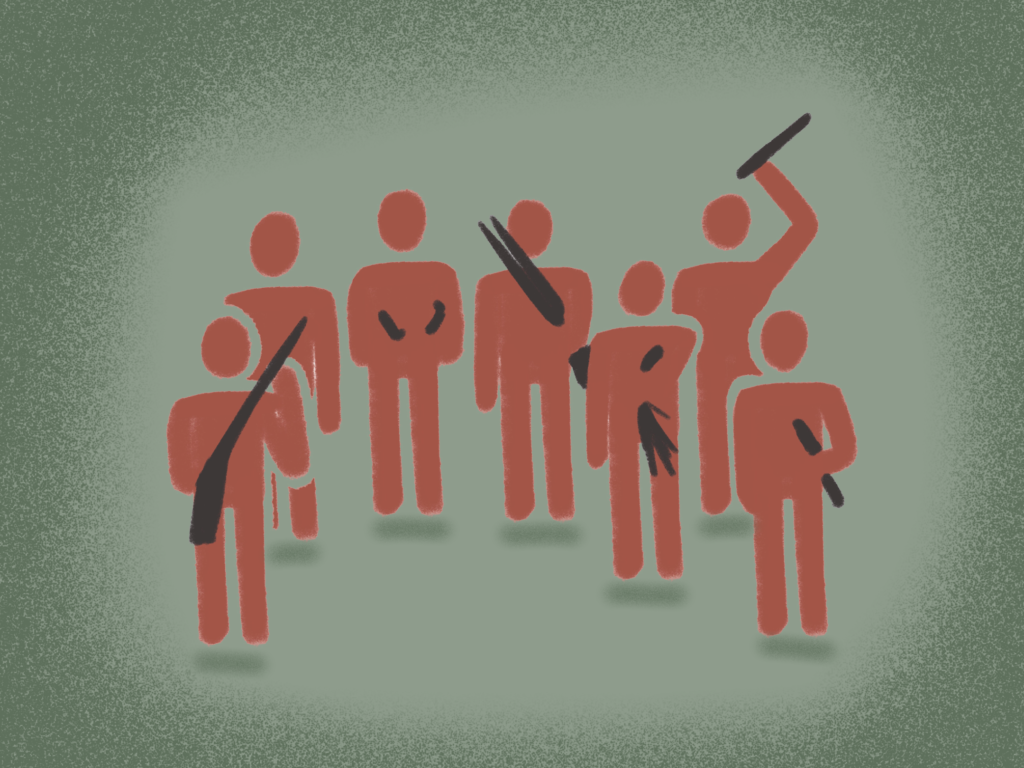
Graphic by Jewon Im ’23 /The Choate News
El Salvador declared a state of emergency in response to the death of 62 civilians in a series of horrific gang-related murders following March 26, the most violent day in the last 20 years of its history.
Organized crime groups pose a serious threat to the stability of El Salvador and to the safety of its citizens, yet according to the US Treasury, the Salvadoran government continues to participate in secret negotiations with these gangs. In response, the United States imposed sanctions on the administration under President of El Salvador Nayib Bukele. However, we must realize that it’s the United States’ responsibility to interfere and mitigate the effects of these gangs due to its role in creating the issue.
The prominence of organized crime groups in El Salvador makes it one of the most dangerous countries in the world. As a result, many nationwide attempts have been made to combat gang violence and control drug routes across Central America. Though it may seem that the most recent effort led by Mr. Nayib Bukele to reduce gang violence has been effective, the purported secret meetings between the government and the gangs paint a more sinister picture of the situation.
The two most prominent Salvadoran gangs, MS-13 and Barrio 18, were originally bred on the streets of Los Angeles in the late 90s. During former President Bill Clinton’s immigration crackdown, the United States deported foreign-born residents convicted of wide-ranging crimes, including members of crime groups from Latin America. Thousands of convicts, some of who were members of MS-13 and Barrio 18, found an export mechanism into the Northern Triangle — the neighboring Central American countries of El Salvador, Honduras, and Guatemala — through their deportation. The deported gang members brought gang culture, urban warfare tactics, and extensive criminal networks into the institutions of El Salvador, causing incessant conflict, alarming poverty, and ingrained corruption.
Many believe the United States relieved their burden of dealing with violent gangs at El Salvador’s expense, and in return, must assist El Salvador in combating criminal gangs. Recently, the United States declared Salvadoran gangs a “transnational threat” and accused the Bukele administration of corrupt negotiations with these gangs. The United States then imposed sanctions on multiple government officials accused of negotiating with notorious local gangs.
Through several modern global conflicts, such as the war in Afghanistan, U.S. participation resulted in nationwide financial and political repercussions. American-bred gangs pose this same threat to El Savador, obligating America to help fix the problem it created.
The United States should continue conducting thorough investigations to reveal the corrupt nature of the Bukele administration, aiding non-government organizations with resources and law enforcement to mitigate Salvadoran gang violence, and imposing sanctions on corrupt political leaders to emphasize the need to cease their negotiations with gangs. The United States must reevaluate its methods of immigration control and the severe impact that mass deportations may have on the stability of neighboring countries. Though deporting convicts to the Northern Triangle may seem to efficiently remedy overpopulation and gang violence, in doing so, the United States has exacerbated extensive damage and suffering to its neighboring countries.
If the United States is to intervene in the ongoing corruption and gang violence in El Salvador, they must prioritize providing aid to the civilians of El Salvador. Through the proper incorporation of law enforcement and the creation of youth crime prevention programs, the United States will be able to contain the violence caused by Salvadoran gangs and stifle their growth. Diplomatic efforts must be made with the affected nations of the region — El Salvador, Guatemala, Honduras, and Mexico — to establish coordinated, comprehensive approaches to dealing with local gangs. Through the collective criminal history and gang affiliation of the United States with the affected countries, they will be able to identify the vulnerabilities of transnational criminal gangs and disrupt their criminal activities. The U.S. will be able to help identify, prosecute, and incarcerate transnational gang members while preventing the growth and birth of new local gangs.
The United States has had an extensive history of gang violence within its borders, whether it be organized crime during the Prohibition era or the ruthless drug cartels of the modern-day. It is this history and the connection to transnational gang origins that cause harm in the Northern Triangle. Considering the U.S.’ role in creating Northern Triangle gang violence, the government is obligated to intervene to limit the prominence of gangs in El Salvador. However, it is imperative that instead of punishing and censuring countries with the inability to properly deal with gang violence, the U.S. provides direct support by working to limit gang activity.




